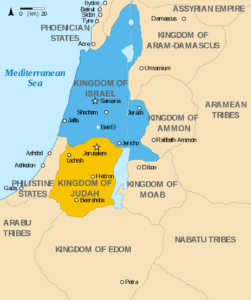
[Listen to an audio version here
Does God care about this world at all? Sometimes we look at the world, and it feels like God is completely silent and unconcerned. For the prophet Amos, the world looked very different. For Amos, God was speaking. He was concerned about the world and His words were like the roaring of a lion. As Rabbi Abraham Heschel put it, “Most of us who care for the world bewail God’s dreadful silence, while Amos appears smitten by God’s mighty voice” (The Prophets, 35).
At first sight, we might think that God’s concern for the world will comfort us, but this might not be the case. We assume God is on our side, but God is on His own side. He is the Lord. He is the commander. He is the lion. When the Lord comes, He will challenge us in our complacency. What have we made of ourselves? What have we done with what God has given us? Meeting God might not be so easy or comforting as we think. That’s the power of the vision of Amos, and it’s one that we want to explore in this sermon. Here, I want you to see some important points about the context of the book and then a summary of the content of the book. After that, there are important considerations we should take from the book. So, the context, content, and considerations.
Context
To appreciate this prophecy, we need to understand three things about the context.
 The first thing is to understand that the people of Israel were divided into two nations. Remember that God had raised up David to reign over His people and that under his son, Solomon, the united nation had done amazing things. However, when King Rehoboam son of Solomon succeeded to the throne, 10 of the tribes revolted. They formed the northern kingdom which was called “Israel” with its capitol in Samaria. The tribes of Judah and Benjamin remained loyal to the house of David. This is the southern kingdom, and it is called “Judah” with its capitol in Jerusalem. This is crucial background information for much of the work of the prophets.
The first thing is to understand that the people of Israel were divided into two nations. Remember that God had raised up David to reign over His people and that under his son, Solomon, the united nation had done amazing things. However, when King Rehoboam son of Solomon succeeded to the throne, 10 of the tribes revolted. They formed the northern kingdom which was called “Israel” with its capitol in Samaria. The tribes of Judah and Benjamin remained loyal to the house of David. This is the southern kingdom, and it is called “Judah” with its capitol in Jerusalem. This is crucial background information for much of the work of the prophets.
The second thing to understand is that Amos was from the southern kingdom of Judah, but he preached a severe message to the northern kingdom of Israel. So, why would Amos go to those who would regard him as a foreigner and give a message they would almost certainly not like? Answer: God told him to. In chapter 7, we read, “Then Amaziah the priest of Bethel sent a message to Jeroboam king of Israel: ‘Amos is raising a conspiracy against you in the very heart of Israel. The land cannot bear all his words'” (7:10). We then read, “Then Amaziah said to Amos, ‘Get out, you seer! Go back to the land of Judah. Earn your bread there and do your prophesying there'” (7:12). Here is what Amos replied, “I was neither a prophet nor the son of a prophet, but I was a shepherd, and I also took care of sycamore-fig trees. But the Lord took me from tending the flock and said to me, ‘Go, prophesy to my people Israel’” (Amos 7:14–15). Amos had a message from the Lord, and he could not hold it in. As he said, “The lion has roared—who will not fear? The Sovereign Lord has spoken—who can but prophesy?” (Amos 3:8). He would do this in spite of the challenge of being from a different kingdom.
